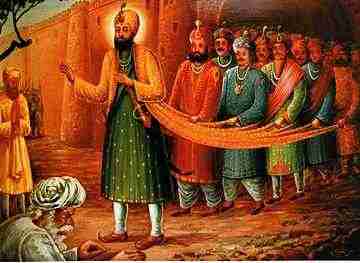Everyone celebrates Diwali in India as do Indians abroad. And when it comes to celebrating popular festivals like Diwali or Christmas, the colorful and socially vibrant Sikhs are renowned for outdoing their neighbors.
Even though Diwali is primarily known as a Hindu festival, it also has a special significance for Sikhs. Hindus celebrate Diwali, the festival of lights when, according to the Indian lore, Lord Rama returned home after destroying Ravana who had taken away Rama’s wife. This story, of course, has no significance in the Sikh tradition.
In Sikh history, it became second important day after Baisaikhi festival in April for its significance during Sikh Struggle for freedom from oppressive Mughal regime in 1600s.
 The Sixth Guru Hargobind, was freed from imprisonment in the famous fort of Gwalior by Emperor Jahangir in October, 1619. The reason for the young Guru’s imprisonment was no more than religious bigotry. The Guru’s father, Guru Arjan, had been martyred for the same reason. According to Sikh tradition, the Guru agreed to be freed only if the other Indian chiefs (rajahs) imprisoned with him were freed. Jahangir was under pressure from moderate but influential Muslim religious leaders like Hajrat Mian Mir, a friend of the Guru. So he relented grudgingly and ordained, “Let those rajahs be freed who can hold on to the Guru’s coat tails and walk out of prison”. He had in mind no more than four or five being freed with the Guru. However, the Guru was not to be outmanoeuvred in this way. He asked for a special coat to be made with 52 coat tails – same number as the rajahs in prison with him! And so the rajahs were freed and the Guru became known popularly as the “Bandi Chhor” (Deliverer from prison). He arrived at Amritsar on the Diwali day and the Har Mandar (now known as the “Golden Temple”) was lit with hundreds of lamps i.e. he was received in the same way as the Lord Rama and the day came to be known as the “Bandi Chhor Divas” (the day of freedom).
The Sixth Guru Hargobind, was freed from imprisonment in the famous fort of Gwalior by Emperor Jahangir in October, 1619. The reason for the young Guru’s imprisonment was no more than religious bigotry. The Guru’s father, Guru Arjan, had been martyred for the same reason. According to Sikh tradition, the Guru agreed to be freed only if the other Indian chiefs (rajahs) imprisoned with him were freed. Jahangir was under pressure from moderate but influential Muslim religious leaders like Hajrat Mian Mir, a friend of the Guru. So he relented grudgingly and ordained, “Let those rajahs be freed who can hold on to the Guru’s coat tails and walk out of prison”. He had in mind no more than four or five being freed with the Guru. However, the Guru was not to be outmanoeuvred in this way. He asked for a special coat to be made with 52 coat tails – same number as the rajahs in prison with him! And so the rajahs were freed and the Guru became known popularly as the “Bandi Chhor” (Deliverer from prison). He arrived at Amritsar on the Diwali day and the Har Mandar (now known as the “Golden Temple”) was lit with hundreds of lamps i.e. he was received in the same way as the Lord Rama and the day came to be known as the “Bandi Chhor Divas” (the day of freedom).
Another important Sikh event associated with Diwali is the martyrdom in 1734 of the elderly Sikh scholar and strategist Bhai Mani Singh, the Granthi (priest) of Harmandar Sahib (Golden Temple). He had refused to pay a special tax on a religious meeting of the Khalsa on the Diwali day.
Hence, the ancient Indian festival of Diwali, more for historical reasons than religious, has acquired a very special significance in the Sikh tradition.
Leave a Reply